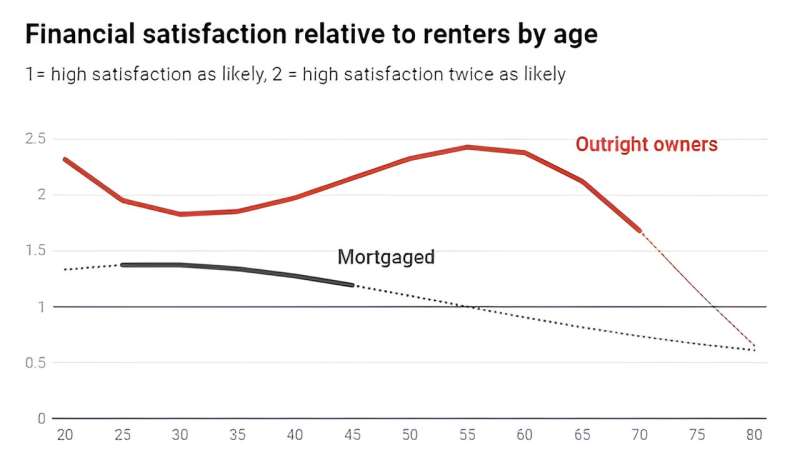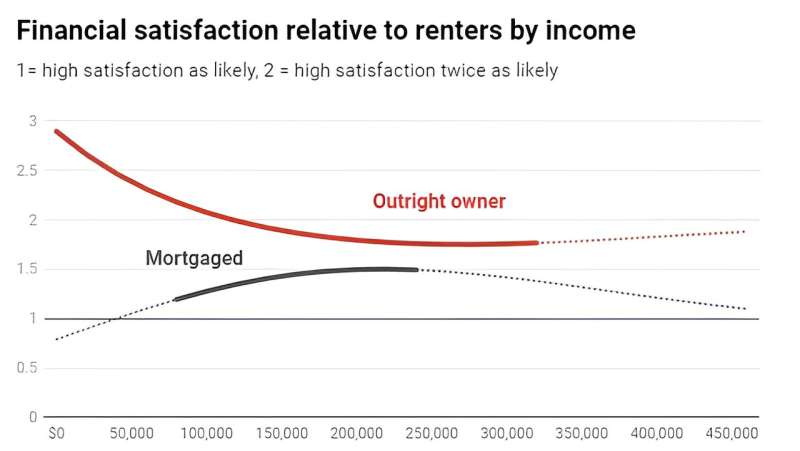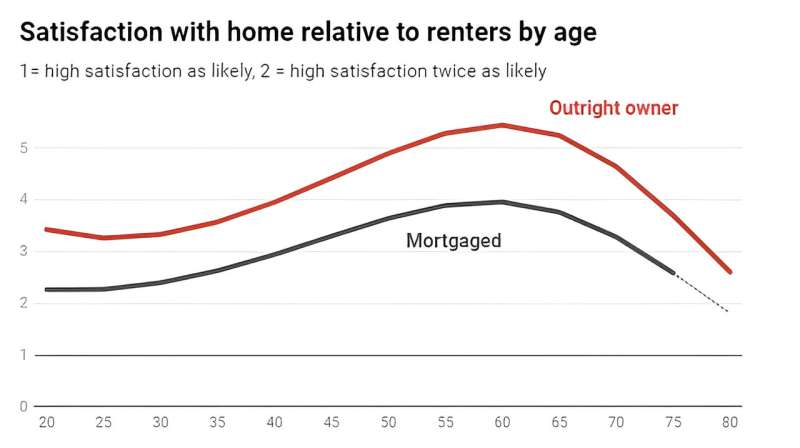This article has been reviewed according to Science X's editorial process and policies. Editors have highlighted the following attributes while ensuring the content's credibility:
fact-checked
trusted source
written by researcher(s)
proofread
Homeowners often feel better about life than renters, but not always—whether you are mortgaged matters

Homeownership has long been thought of as the great Australian dream. For individuals, it's seen as the path to adulthood and prosperity. For the nation, it's seen as a cornerstone of economic and social policy.
Implicit in this is the assumption that owning a home rather than renting one makes people better off.
It's an assumption we are now able to examine using data from the government-funded Household, Income and Labour Dynamics in Australia (HILDA) survey, which for two decades has asked questions both about homeownership and satisfaction with life.
The overarching question asks, "All things considered, how satisfied are you with your life? Pick a number between 0 and 10 to indicate how satisfied you are."
We also looked at people's satisfaction with their financial situation, their home and the neighborhood in which they live.
In a study published in the journal Urban Studies, we linked those answers to home ownership and characteristics including age and income.
As expected, we found homeowners were generally more satisfied with their lives than renters. But we also find the extent to which they were more satisfied depended on whether or not they were still paying off a mortgage.
Mortgaged homeowners about as satisfied as renters
Outright home owners were 1.5 times as likely to report high overall satisfaction as renters. But home owners still paying off a mortgage were only a little more likely to feel high overall satisfaction.

Similarly, outright owners were 2.3 times as likely to report high financial satisfaction as renters—but mortgaged owners were only 1.1 times as likely.
When it comes to satisfaction with their home and neighborhood, the differences were less extreme.
Outright home owners were 3.1 times as likely to report high satisfaction with their home as renters, while mortgaged owners were 2.8 times as likely.
Outright owners were 1.6 times as likely to report high satisfaction with their neighborhood as renters, and mortgaged owners 1.4 times as likely.
The results also varied with age and income.
As shown in the graph above, outright owners were more likely to report high financial satisfaction than renters across almost the entire age range.
But mortgaged owners only showed a demonstrably greater financial satisfaction than renters between the ages of 25 and 50.
Beyond age 50, the existence of a mortgage debt burden appeared to cancel out any boost to financial satisfaction from homeownership. This potentially reflects the growing financial stress of making mortgage payments as retirement approaches.
By income, mortgaged owners reported experiencing more financial satisfaction compared to renters the more they earned between A$80,000 and A$240,000. Outright owners experienced more financial satisfaction than renters up to A$320,000.

Beyond these income levels, owners did not have greater financial satisfaction than renters, perhaps because high-earning renters have other sources of financial satisfaction.
How satisfied people feel beyond 60
In other respects, outright owners and mortgaged homeowners showed similar patterns, becoming more satisfied with their homes relative to renters the more they age up—until the age of 60. That's when their satisfaction relative to renters declined, as illustrated below.
This decline might reflect the growing physical burden of maintaining an owned home as people age.
Our study has important implications. One is that age matters.
Although older people consistently express a desire to age in place, we found satisfaction among those who owned vs. rented their home declined beyond age 60. This suggests better integration between housing and care is critical to support people aging in place.
Another implication is that as low-income owners are more reliant on their homes as a source of relative financial satisfaction than high earners, they are more exposed in times of crisis. They may face the risk of being forced to sell suddenly with little time to consider the consequences.
And another implication is as the relative financial satisfaction of mortgage holders disappears after the age of 50, and as more of us approach retirement with mortgages intact, more of us will either postpone retirement or become dissatisfied.
Our findings suggest the extension of mortgage debt into later life should be discouraged if the benefits of the Australian dream are to be preserved.
Provided by The Conversation
This article is republished from The Conversation under a Creative Commons license. Read the original article.![]()





















